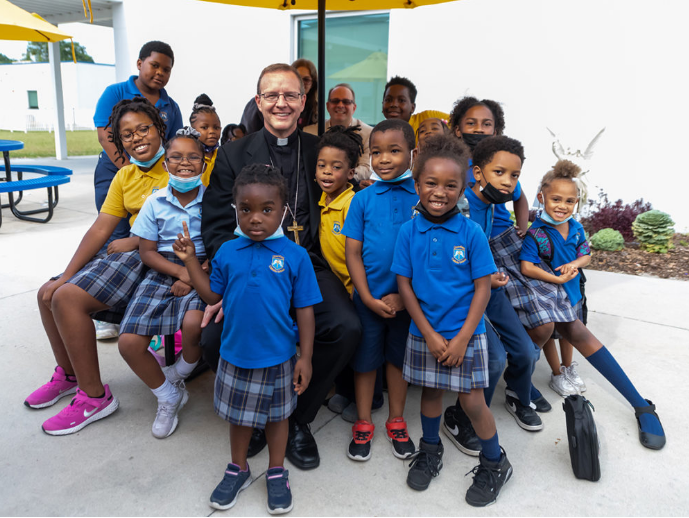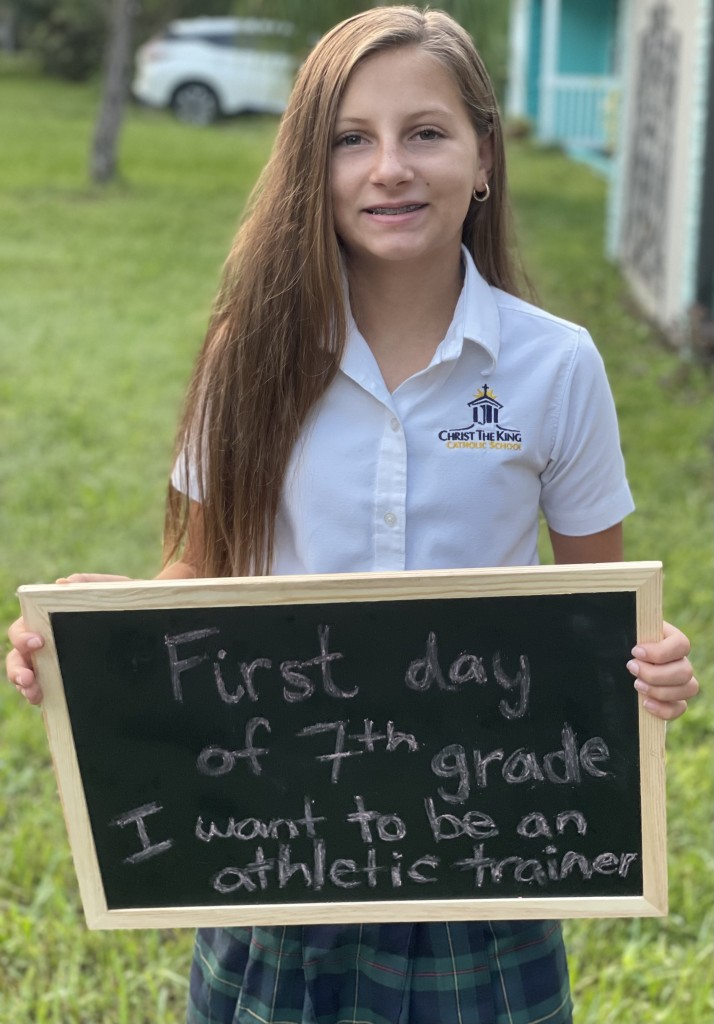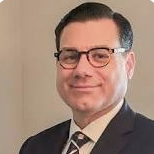JACKSONVILLE, Fla. – The diagnosis was Entamoeba histolytica, which is an infection caused by ingesting an amoeba that produces fatigue, abdominal pain, weight loss, and a few more symptoms you don’t want to have when you are more than 9,000 miles from home.
That’s where Christopher Trinidad happened to be during a visit to his parents’ homeland in the Philippines the summer before the eighth grade.
Born and raised in Jacksonville, Christopher’s immune system was not accustomed to some of the pathogens found in the local food. He had not built up a resistance like residents have. Lying in a hospital bed in the city of Bacolod, while the antibiotics did their thing, Christopher had this thought: “This has to be my science fair project.”
And so it was.
After returning home, Christopher ordered microorganisms online. “Safer organisms,” he said, than the one that waylaid him a few weeks earlier. He experimented with various items found in the kitchen pantry – ginger and garlic – mixed them with water and other ingredients and developed a solution that killed the organisms.
“What if,” Christopher thought, “we use these solutions on the actual thing? This can help so many people.”
His project finished first at a regional science fair.
“Impressive, right? Wait until you hear what he did his freshman year,” said Carla Chin, director of marketing and communications at Bishop Kenny High School in Jacksonville.
Christopher, a sophomore, attends the parochial Catholic school on a Florida education choice scholarship managed by Step Up For Students.
He sat in a chair inside Chin’s office. His father, Greg, sat in another and proudly listened as his son, with a mixture of pride and modesty, described the project that earned first place at a regional science fair and then a bronze medal at the Genius Olympiad and a $15,000 scholarship to the Rochester Institute of Technology at a global competition held in Rochester, New York.
Using an electroencephalogram (EEG), which measures electrical activity in the brain, artificial intelligence, virtual reality, and violin music, Christopher was able to predict the moods and emotions of stroke victims who are unable to speak, thus creating a line of communication with doctors.
“By using brain waves, doctors can know what their patients are feeling, which would lead to better decision-making,” he said.
Michael Broach is the Vice Principal at Bishop Kenny and the Director of Mission Integration, as well as the AP Capstone Department chair. He was responsible for approving Christopher’s science project.
“That was one of the most sophisticated projects, I think, that I've seen in my years of being here,” Broach said. “And just the way his mind works is well above his peers. Well above what you would expect of somebody of his age.”
Christopher is 15.
He wants to be a neurosurgeon.
“I’ve always been fascinated with the brain since I was little,” Christopher said. “It controls everything in our body. It’s really interesting, and going into surgery, fixing people's brains is really complex, and that's what I love about it.”
His parents – Greg and Shiela – are both nurses, so Christopher was raised around medical science. Their house is filled with textbooks related to their careers. Christopher has read them all.
The valedictorian of his middle school, Christopher has a 4.3 weighted GPA at Bishop Kenny. He chose to attend the Catholic high school because it aligns with his faith and has a high academic standard.
“It challenges me,” he said. “I know there are other people here I can talk to, and it gives me a greater experience.”
He’s not the only student at Bishop Kenny who knows what an electroencephalogram is and how it works.
While he spends a considerable amount of time working on his science fair projects (keep reading to learn about what his plans are for this year’s project), he’s very active at school. Christopher is a member of the Science Club, Medical Career Club, St. Vincent de Paul Society, campus ministry, and the Brain Brawl. He plays the piano at the monthly mass. He’s also first violin for the Jacksonville Symphony Youth Orchestra.
Listening to his son talk, Greg had one feeling. “Blessed,” he said. “He has a humble heart. We try to remind him always what’s hard.”
Greg understands hard.
Raised in a small town an hour’s plane ride from Manila, Greg’s childhood was humble at best. He went through elementary school with only two pairs of shoes. He caught rides to school on trucks headed to the sugarcane fields on days when his mom couldn’t afford bus fare.
“I didn’t have the opportunity to join the Boy Scouts,” Greg said. “My mom didn’t have the money.”
Greg understood the power of an education and where it could lead him. He became a teacher until, at age 26, he immigrated to the United States in search of the American Dream.
He worked odd jobs and became a certified nursing assistant. From there, he attended nursing school in St. Augustine. He now works as a traveling nurse in the cardiac catheterization labs in hospitals around North Florida. He became a traveling nurse for the pay because he and Sheila support three family members in the Philippines.
That’s why Christopher traveled to the Philippines the summer before eighth grade, to see where his parents’ stories began.
“I wanted him to see and feel the difference of being here in this world compared to a third-world country,” Greg said.
The lesson wasn’t lost on his son.
“I just feel really lucky that I'm here in America and I have more opportunities than some kids have in the Philippines, and I’m not going to let this go to waste,” Christopher said.
Greg said he is grateful for the Florida education choice scholarship that helps pay Christopher’s tuition at Kenny.
“In the Philippines,” he said, “if you don’t have money, you don’t go to school.
“He has this opportunity of having this scholarship, and I'm telling him, you're way more blessed than what other people have in other states. We're so thankful that all these opportunities are coming for our son.”
Christopher’s next opportunity is this year’s science fair, where he will take last year’s project a step further.
“I'm planning to build a rehabilitative exoskeleton so it can help people with movement disabilities,” he said. “I can also use an EEG in that, so they can think about what they're going to do with their exoskeleton, which basically helps them move. It would correlate to their actual thoughts. So, if they wanted to walk, they would be able to think it, then the exoskeleton would help them walk.”

Keith Jacobs II, affectionately called "Deuce," with his parents, Keith and Xonjenese Jacobs. Photos courtesy of the Jacobs family
When our son Keith — affectionately known as “Deuce” — was diagnosed with autism spectrum disorder at age 3, we were told he might never speak beyond echolalia (the automatic repetition of words or phrases). Until age 5, echolalia was all we heard.
But Deuce found his voice, and with it, a unique way of seeing the world.
He needed to find the right learning environment, with the assistance of a Florida education choice scholarship.
Deuce spent his early academic years in a district public school, supported by an Individualized Education Plan (IEP). Despite the accommodations, learning remained a challenge. We realized that for some, a student’s success requires more than paperwork. It requires community, compassion, and collaboration with the parents.
Imagine having words in your head but lacking the ability to communicate when you need it most. That was Deuce’s experience in public school. His schools gave him limited exposure to social norms and rigor in the classroom. Additionally, through his IEP, he always needed therapy services throughout the school day, which limited his ability to take electives and courses he enjoyed.
His mother and I instilled the importance of having a strong moral compass and working hard toward his social and academic goals. Although we appreciated his time in public school, we knew a change was needed to prepare him for post-secondary education. We applied and were approved for the Family Empowerment Scholarship for Students with Unique Abilities.
Knowing the potential tradeoffs of leaving public school and the IEP structure behind, we chose to enroll Deuce at Bishop McLaughlin Catholic High School in Spring Hill, about 35 miles north of Tampa. We believed the nurturing, faith-based environment would help him thrive. It was the right decision.
Catholic school provided Deuce with the support he needed to maximize his potential. Despite his autism diagnosis, he was never limited at Bishop. He was accepted into their AP Capstone Program. This was particularly challenging, but Bishop was accommodating. The school provided him with an Exceptional Student Education (ESE) case manager dedicated to his success, and he received a student support plan tailored to his diagnosis and learning style. The school didn’t lower expectations; instead, it empowered him to take rigorous coursework with the right guidance.
Any transition for a child with autism will take time to adjust. On the first day, I received a call: Deuce had walked out of class. This was due to his biology teacher using a voice amplifier. The sound overwhelmed Deuce’s senses, and he began “stimming”— rapidly blinking and tapping his hands. Instead of punishing him or ignoring the issue, the staff immediately reached out.
Together, we crafted a Student Success Plan tailored to Deuce’s needs, drawing from his public school IEP without being bound by it. His plan included preferential seating, frequent breaks, verbal and nonverbal cueing, encouragement, and clear direction repetition. For testing, he was given extended time, one-on-one settings, and help understanding instructions.
These adjustments made all the difference.
Throughout high school, Deuce maintained a grade-point average of over 4.0 while taking honors, AP, and dual enrollment courses. Additionally, he was inducted into the National Honor Society and Mu Alpha Theta Math Honor Society while also playing varsity baseball. Because of his success at Bishop, he will continue his educational journey at Savannah State University, where he will major in accounting and continue to play baseball.

Deuce Jacobs earned an academic scholarship to Savannah State University, where he plans to major in accounting and continue playing baseball.
Catholic schools in Florida increasingly are accommodating students with special needs. The state’s education choice scholarship programs have been instrumental in making Catholic education available to more families. Over the past decade, during a time when Catholic school enrollment has declined across much of the nation and diocesan schools have been forced to close, no state has seen more growth than Florida.
At the same time, the number of students attending a Catholic school on a special-needs scholarship has nearly quadrupled, from 3,004 in 2014-15 to 11,326 in 2024-25. Clearly, many families are choosing the advantages of a private school education without an IEP versus a public school with an IEP.
So, I’m puzzled why federal legislation being considered in Congress, the Educational Choice for Children Act (ECCA), includes a mandate that that all private schools provide accommodations to students with special education needs, including those with IEPs.
Although more and more students with special needs are accessing private schools, not every school can accommodate every student’s unique needs (which is also true of public schools). And, as I learned with Deuce, some schools can accommodate students more effectively if they aren’t bound by rigid legal mandates and have the flexibility to collaborate with parents who choose to entrust them with their children’s education.
If the IEP mandate passes, it would prohibit many schools from accepting funds through a new 50-state scholarship program, undermining the worthy goal of extending educational choice options to more families. The U.S. Conference of Catholic Bishops has called it a “poison pill” that would “debilitate Catholic school participation.”
Bishop McLaughlin’s willingness to partner with me as a parent not only allowed Deuce to succeed academically but also gave him the dignity and respect every child deserves. IEPs work for many. For others, like Deuce, it takes something more like collaboration to build a path forward together.

Bishop Erik Pohlmeier visits with students at Guardian Catholic Schools in Jacksonville. PHOTO: Fran Ruchalski
Editor’s note: Deacon Scott Conway, Cabinet Secretary of Education and Formation and Superintendent of the Schools for the Diocese of St. Augustine, wrote this commentary in recognition of Catholic Schools Week.
 As we prepared for Catholic Schools Week, which is Jan. 29 – Feb. 4, 2023, I could not help but think of the many great people who have sacrificed and developed the second largest educational system in the country, Catholic education.
As we prepared for Catholic Schools Week, which is Jan. 29 – Feb. 4, 2023, I could not help but think of the many great people who have sacrificed and developed the second largest educational system in the country, Catholic education.
Some of those great people include St. John Neumann, St. Elizabeth Ann Seton, St. Catherine Drexel, members of many religious communities, and lay educators. This is not to say that the success of Catholic schools over the centuries has been without challenges. One of the great challenges has been long-term sustainability with the rising cost to educate students and the rising cost of tuition for parents.
We are so proud of our Catholic schools and the work that we do to support families throughout the country. We were founded on serving the indigenous people, the poor, and the immigrants. Our theme for Catholic Schools Week throughout the nation is “Catholic Schools: Faith, Excellence, and Service.” It is our desire to serve everyone, regardless of religion, so that all people may experience the gospel message and have a conversion of heart to Christ Jesus.
Faith
We pride ourselves as Catholic schools on our Catholic identity, as this is what makes us unique. We are the evangelizing arm of the church that continues to this day to be the largest ministry of the Catholic Church in the United States. Our educators are highly qualified and share their faith each day with the children regardless of the subject matter they are teaching.
Excellence
The second most important characteristic of Catholic schools is academic excellence. We see this year after year as our schools help students to be the best they can be.
Each year Catholic schools throughout the nation join other schools in taking the National Assessment of Education Progress that leads to the national report card. Each year our schools outperform other models of education throughout the country. We are so proud of the work of our educators and the students who work so hard every day in our Catholic schools.
Service
It is service that many people think of when they think of the Catholic Church and Catholic schools. The reason for this is that we do it so well and help so many people. From helping those in the community with cleaning up their property, to helping in food pantries, to collecting the food to serve those less fortunate, we continue to work together in service of our neighbor as Christ taught us.
Let us continue to pray for one another and allow this Catholic Schools Week to be one of an encounter with the risen Lord in the classroom.

Ayla Hale
On this episode, senior writer Lisa Buie talks with Kristin Hale of Jacksonville, Florida. Hale chose Christ the King Catholic School for her daughter, Ayla, the school she herself attended and where she teachers language arts and reading.
Until she got married last year, Hale had been a single mom to Ayla, 12, who attends her private school on a Florida Tax Credit Scholarship. The Florida Legislature established the program in 2001 to provide an income tax credit for corporations that contribute money to nonprofit scholarship funding organizations that award scholarships to students from families with limited financial resources.
The program has been expanded to include several other credits related to various industries such as insurance, oil and gas, and alcoholic beverages. Step Up For Students, which hosts this blog, is the state’s largest administrator of the FTC Scholarship Program.
Hale said she learned about the program while teaching at a private school that served students living in the inner city. Being a single parent and a teacher, she applied, thinking her income might be low enough to qualify Ayla for a scholarship.
She had to take out loans to pay for the wrap-around care her daughter needed to supplement the state’s subsidized voluntary prekindergarten program and knew it would be nearly impossible to send Ayla to Christ the King without financial help.
Fortunately for Hale and Ayla, they were approved on the first try. Ayla has been attending the K-8 school ever since. Not only did the scholarship allow her the opportunity to provide a high-quality private education in a safe environment, Hale said; the money she saved made it possible for her to become a homeowner and to welcome Scarlett, a golden retriever, who has brought the family much joy.
“We were so much more free to have a decent life," Hale said. "I knew her academic future would so much brighter.”
As much as the scholarship has changed their lives, l said spending flexibility in the form of education savings accounts could help even more, as the funds could be used for Ayla’s extracurricular activities such as volleyball. Hale said ESAs could also help families with more than one child, ensuring that each would benefit from the best possible educational fit.
EPISODE DETAILS:

Catholic Education Partners believes parental empowerment over their children’s education opportunities will allow more families to benefit from Catholic education, allay the Catholic school-funding crisis, protect the religious integrity and autonomy of parochial schools, and ultimately serve the Common Good.
On this episode, reimaginED Senior Writer Lisa Buie talks with Shawn Peterson, president of Catholic Education Partners, a nonprofit organization based in the Minnesota Twin Cities area.
A former staff member in the Minnesota Legislature who worked for two Minnesota governors, Peterson talks about growing up in various learning environments, how his time in government inspired him to join the education choice movement, the benefits of a Catholic education for Catholics as well as non-Catholics, and trends in Catholic education.

Shawn Peterson
“I saw budgets grow and get bigger and bigger. I saw test scores continue to decline, graduation rates go down, reading and math proficiency get worse, and minority and economically disadvantaged children suffer the most. I started looking at the results non-government schools were getting …
“These kids were doing so much better in non-government schools. If you’ve got money, you’ve already got education choice. If you don’t have money, that’s when you don’t have choice. My time in the Legislature and seeing what went on in conference rooms and hallways made me realize that parents should have these opportunities and these choices.”
EPISODE DETAILS:
LINKS MENTIONED:
https://catholiced.us/wp-content/uploads/2022/05/CATHOLIC-EDUCATION-PARTNERS_Booklet.pdf
https://press.vatican.va/content/salastampa/en/bollettino/pubblico/2022/03/29/220329c.html